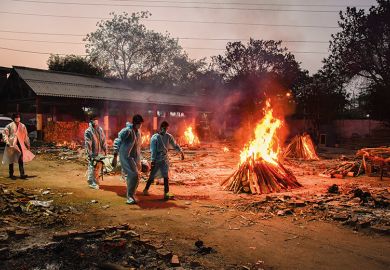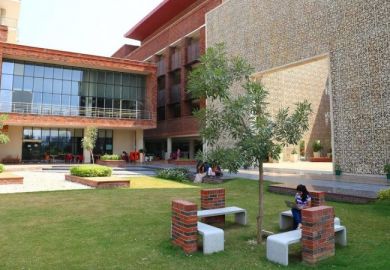As India reels from an unprecedented and ruthless second wave of the Covid-19 pandemic, university students, staff and their families are suffering as much as everyone else.
Aligarh Muslim University, one of India’s best universities, has reportedly lost 16 current and 18 retired faculty members to Covid-19 over the past few weeks. The University of Delhi, selected as an Institution of Eminence (IoE) by the Indian government, has lost 15 teachers to Covid-19. Other campuses are experiencing similar health catastrophes as well, and there is no sign of the deaths abating any time soon.
As India’s higher education sector will continue to hurt from the pandemic, it is premature to fully anticipate the fallout. Much will depend on the cumulative human and economic costs of the pandemic through this year and beyond.
Much will also depend on the Indian government’s priorities in the post-Covid years. But we can take a reasonable guess at those. Even after India returns – as it presumably will – to its “normal” high rates of economic growth, it is likely that the political focus will remain on recovering from the economic contraction and addressing the social costs of the pandemic years, particularly rising unemployment and poverty rates. The current government is also likely to prioritise countering the ever-present military threat from China and Pakistan.
This implies that the pandemic will prove to be financially disruptive and eventually devastating for India’s public universities. In particular, public universities funded by state governments – which have been suffering from long years of neglect, poor regulation and lack of adequate financial support – will rapidly deteriorate further.
The same fate may befall many central universities, which are funded directly by the government in New Delhi. This is because even if India experiences a quick and significant economic recovery, the current government is unlikely to devote scarce resources to higher education in the years leading up to 2024 – when the national elections will be held next – since there are no electoral benefits from doing so.
By the same token, there are no political consequences for failing to improve the supply or quality of public goods. That is why – with some exceptions – the Indian state, at both central and state levels, has such a poor spending record in areas such as health and education over several decades. Instead, most Indians – and not only those that are affluent – have increasingly relied on private solutions – in higher education as much as in health and school education.
There is no doubt that India needs a mix of public and private universities to address the growing demand for education from its millions of young people. That being said, the rise of the lucrative private education sector – which now enrols around two-thirds of India’s higher education students – also has more personal benefits for politicians. As Rahul Verma, a fellow at the Centre for Policy Research in New Delhi, has pointed out, leaders of all political parties have invested heavily in it.
Other than social status, the ownership of schools and colleges brings financial and political benefits to politicians. It may only be a slight exaggeration to suggest that the ruin of India’s public universities is in the interests of its political class. The fact that it is typically students and teachers at public universities who are the most vocal critics of government policies only adds to ministers’ sense that these institutions do not deserve their protection.
The problem with private universities is that most are “degree shops”, offering mediocre education. In all fairness, the same may be said of public institutions. However, the fact is that a college degree from a private institution costs much more than one from a public university. This not only makes them less accessible but also leads to higher levels of debt without substantially improving the life chances of the degree holder.
In sum, the prognosis for India’s higher education in the post-Covid years is somewhat bleak. And under such conditions, the country’s expected gains from its demographic dividend will take a further hit.
Pushkar is director of the International Centre Goa, Dona Paula (Goa). These are his personal views.
POSTSCRIPT:
Print headline: The road to mediocrity
Register to continue
Why register?
- Registration is free and only takes a moment
- Once registered, you can read 3 articles a month
- Sign up for our newsletter
Subscribe
Or subscribe for unlimited access to:
- Unlimited access to news, views, insights & reviews
- Digital editions
- Digital access to THE’s university and college rankings analysis
Already registered or a current subscriber?








